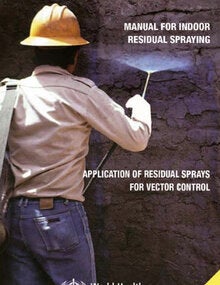The World Health Organization (WHO) specifications for public health pesticides are part of the International Code of Conduct on the Distribution and Use of Pesticides, and are used for quality control and international trade.
The WHO Pesticide Evaluation Scheme (WHOPES) develops specifications for public health pesticides once they have been fully tested for their safety and efficacy in the laboratory and in the field.
WHOPES promotes the safe, judicious and proper use of pesticides, including their safe and proper application. Such application relies mainly on the quality and working conditions of the equipment, as well as the skills and knowledge of the operators using the equipment. WHOPES has developed and published specifications for pesticide application equipment for vector control to provide the minimum standards and requirements for safe and proper performance.
Indoor residual spraying is used especially for control of malaria and Chagas disease vectors. However, where indoor residual spraying is used, it is essential that staff are fully trained in application techniques and maintenance of the application equipment. With good skills and high-quality application equipment, hazards to human health and the environment as well as financial losses can be avoided.
This manual is intended to serve as a model for developing relevant training manuals and procedures at country level to ensure safe and effective use of insecticides in vector control programmes.
As specified in the latest Equipment for vector control – Specification guidelines, 1 users should fit a control flow valve to the nozzle to ensure constant output of spray for more uniform application of the insecticide. This third edition also contains easy-to-follow steps in the preparation of insecticide sprays.
|

